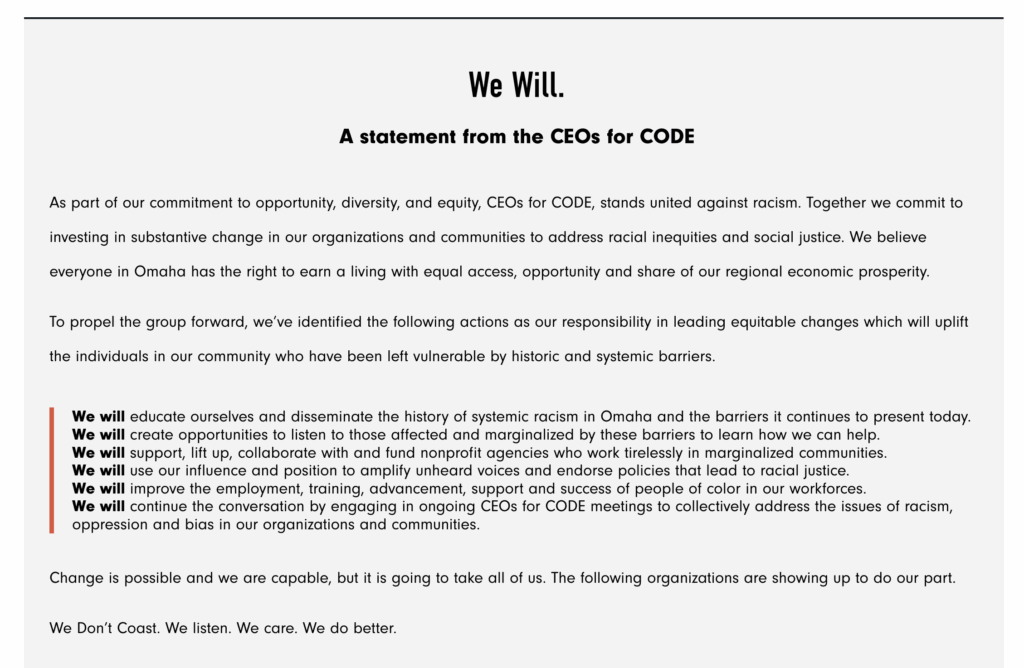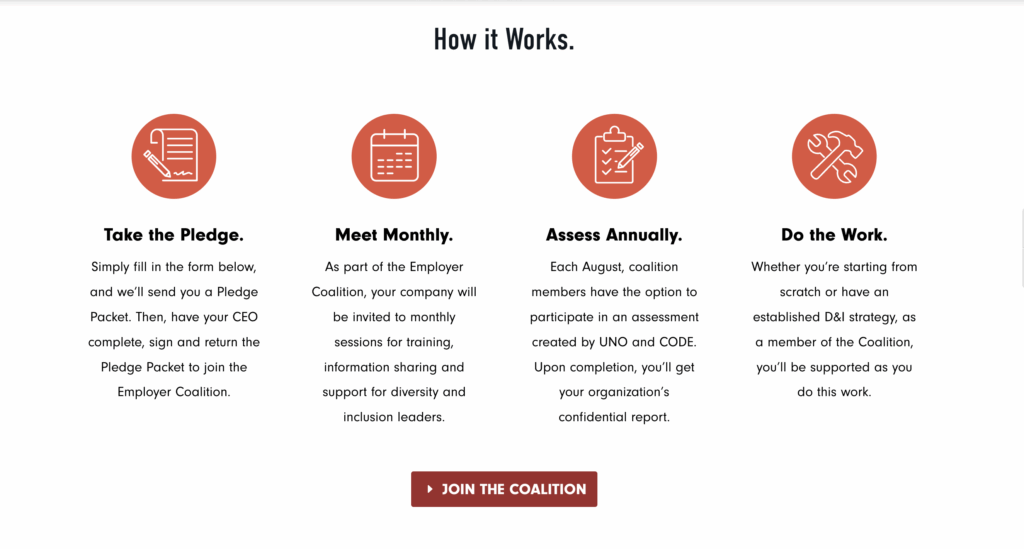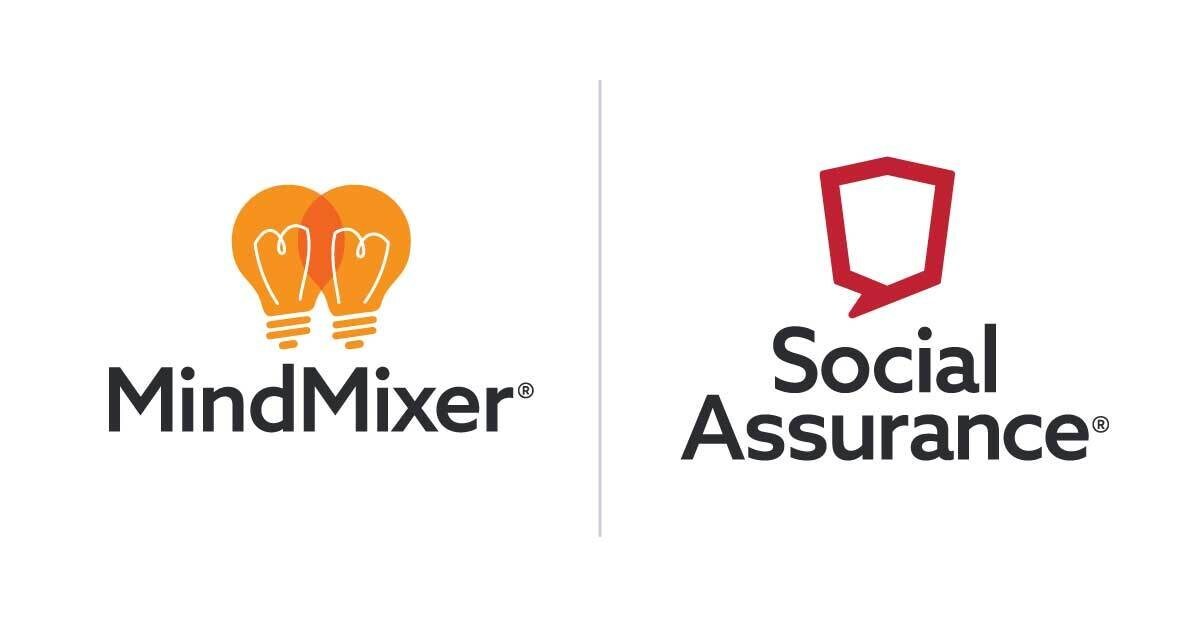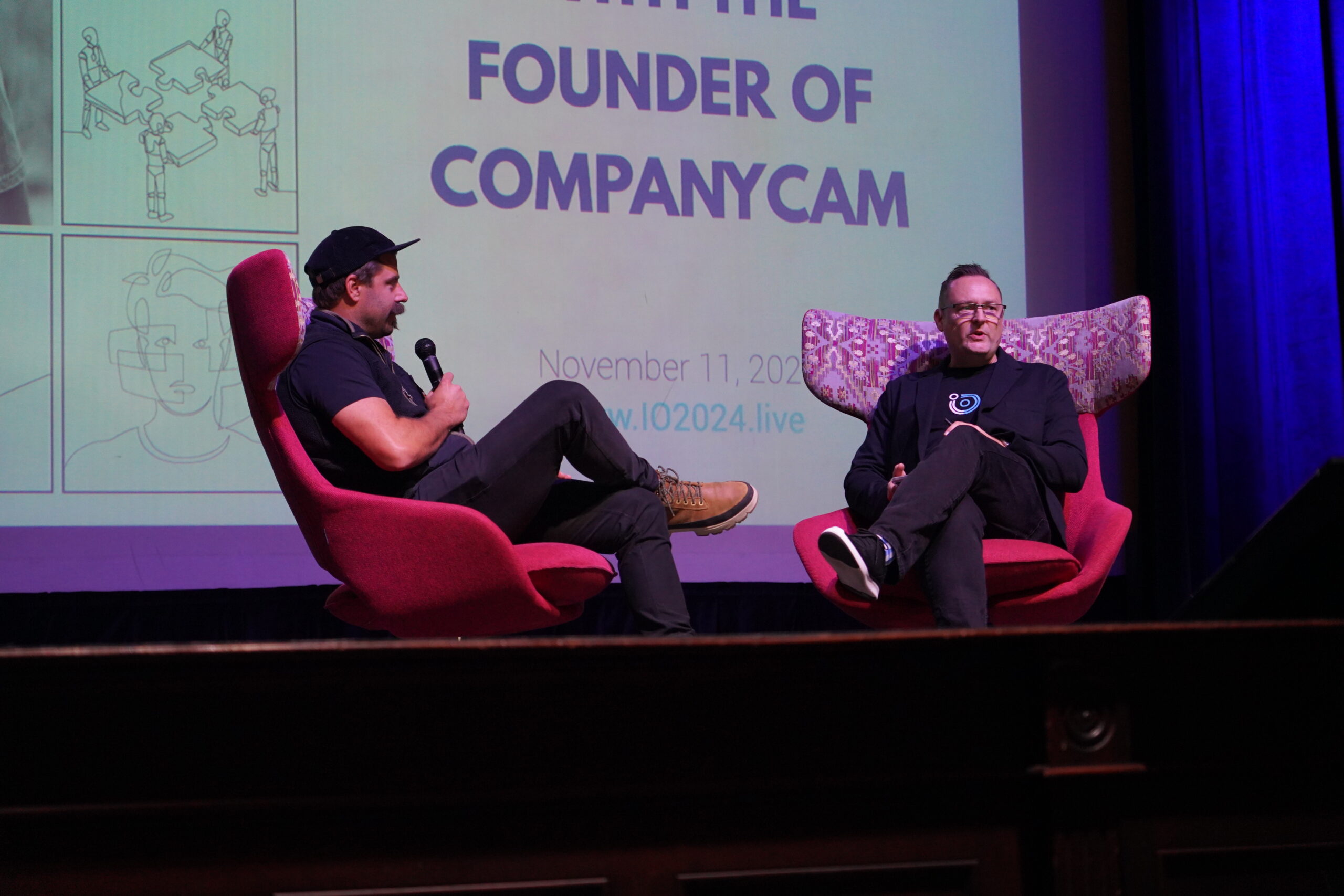On May 25, 2020, George Floyd, a Black man in Minneapolis, was murdered by a police officer, sparking mass unrest and renewed scrutiny of racism and inequality in America. Nine days later, on June 3, the Greater Omaha Chamber of Commerce gathered almost 150 business leaders to figure out a local response.
By mid-June, over 200 businesses had signed on to the resulting “We will” pledge through the chamber’s Commitment to Opportunity, Diversity and Equity (CODE) initiative. “Together we commit to investing in substantive change in our organizations and communities to address racial inequities and social justice,” the CEOs for CODE statement said.
The pledge kicked off a flurry of activity as CODE convened the Omaha business world to turn promises into reality. “I had been (involved) long enough to know that just because a business leader says publicly that they’re committed to something, that that’s (not necessarily) going to prove to be true,” said Joe Gerstandt, an Omaha-based diversity, equity and inclusion (DEI) consultant. But “it felt very serious … a lot of us were hopeful, but we also were going to wait and see what happened.”
At the time, leaders were explicit that CODE’s DEI work needed to last. “It can’t be hot in ’20 and cold in ’21,” Tim Burke, then-CEO of the Omaha Public Power District and board chair of the chamber, told Omaha Magazine.
By that measure, today’s environment for diversity work is practically freezing. Across the country, many businesses have toned down their language and stepped back from 2020 commitments. Meanwhile, DEI has been vilified amid a political backlash led by President Donald Trump.
This trend is also visible in Omaha, in part through CODE’s progression over the last five years. Once the focal point for local corporate DEI, the initiative was rebranded earlier this year to Workforce Excellence. The Greater Omaha Chamber’s website no longer mentions CODE or DEI, and the 2020 CEOs for CODE pledge is also gone. (The old webpages are still available and searchable through Google.)

The pullback, while disappointing to some community members, is not a surprise given previous boom-bust cycles of attention to racial justice. “To a certain point, I think a lot of us expected it,” said A.M. “Bobby” Brumfield, a risk management advisor at Leonum Advisors, who was involved with CODE and the chamber. But “I got to give the chamber credit for fighting with it and pushing (DEI efforts) as long as they could.”
The Greater Omaha Chamber declined to comment for this story. “It seems as though you have already decided to (write this story) with a negative angle — that is unfortunate and we disagree,” wrote Aron Wehr, the chamber’s vice president of marketing and communications, in an email to Silicon Prairie News. “We have seen much enthusiasm for the Workforce Excellence program and look forward to its continued impact on our community.”
The arc of CODE
CODE started in 2018 as part of the chamber’s Omaha 2040 plan to help the city’s businesses be ready for an increasingly diverse workforce. By 2050, minorities are projected to be 41% of the Omaha metro population, according to the chamber. Meanwhile, national data shows that young Americans are more diverse than previous generations.
“Our job was to get the business community in the room,” said David Brown, the former president and CEO of the chamber. Then to “provide them the tools … to be able to accommodate a growing percentage of their workforce that was going to be non-white.”
Brown said CODE was well received by local business leaders at the time. And, by virtue of already being a convener around diversity issues, it was also in a good position to channel 2020’s explosive conversations about racial justice into action.
As CODE worked to educate CEOs across meetings, studies and conferences, one committee was tasked with developing a DEI playbook for businesses. Initially, working on the playbook added to a sense that “these corporations were serious (about 2020 promises) because almost all of them came to the table,” said Brumfield, who co-chaired CODE’s playbook committee.

The committee talked with HR professionals and managers up and down the corporate ladder to write the 20 page playbook. It included demographic data, a guide to restructuring business for diversity, the benefits of DEI and a glossary of terms ranging from “structural racism” to “implicit bias.”
But after the playbook was published in 2022, Brumfield’s optimism gave way to disappointment, as he felt large corporations started to back away from CODE’s work. “I don’t think (the playbook) was adopted as widely as we had hoped for,” he said. Now, Brumfield feels that neither the playbook nor CODE had enough time to make a significant impact on Omaha, through no fault of the chamber.
“The chamber can’t make CEOs do certain things,” he said. “At the end of the day … that burden (to advance diversity) is on corporate Omaha, and corporate Omaha is dropping the ball.”
As the energy of 2020 dissipated and the political backlash started, there was staff turnover at CODE. Meanwhile, some vocal champions for business DEI in Omaha, like Tim Burke of OPPD and the chamber’s Brown, retired.
CODE’s work continued. By 2023, more than 300 business leaders had signed on to the CEOs for CODE pledge, and the annual CODE Conference was still going strong into 2024, openly talking about DEI over two days in early October.
Then, in November, President Donald Trump was elected to a second term after promising to crack down on DEI initiatives. Just a few months after Trump took office, the chamber’s CODE became Workforce Excellence and was scrubbed of DEI language — with phrases like “untapped talent pipelines” and “historically marginalized talent” taking its place. Dell Nared, previously the head of CODE, now leads the Workforce Development initiative.
“CODE is evolving into a broader workforce initiative that strategically aligns with employer needs while continuing to drive impact through representative workforce solutions,” said a chamber email, shared with SPN, announcing the rebrand.
Few changes to show as DEI moves out of the spotlight
Brown recognizes the frustration some people have with the business world’s DEI pullback. But the work continues behind the scenes, he said, even as terminology changes and businesses avoid the spotlight.
That’s something Brown sees in his post-retirement consulting job while working with chambers of commerce across the country. “The work has refined,” he said. “It’s gone from, ‘We’ve got this great, big issue’ that everybody was trying to figure out what their role was, to now, businesses know what they can do in this space.”

The basic demographic future for Omaha and other regions — an aging population and more non-white young workers — hasn’t changed. So companies still need to attract and retain a diverse workforce, in line with 2020 promises, Brown said, and should get credit for doing so.
But not everyone is confident that the business world knows how to support a diverse workforce, with or without the specific language of DEI. “I know people that were hired here in Omaha, but also in other communities, to be the first person in their company to lead DEI efforts,” said Gerstandt, the DEI consultant. “No real job description, no real strategic plan, no explicit budget.”
Looking at the bigger picture, the business world also has little progress to show for its 2020 pledges. That’s starkly visible in the entrepreneurial world, especially with venture capital, said Erica Wassinger, co-founder and general partner at Proven Ventures.
In 2024, about $730 million, or just 0.4% of all venture capital funding, went to startups with a Black founder or co-founder. That’s a fraction of the almost $5 billion Black-led startups saw in 2021, which still amounted to a tiny piece of the V.C. pie.
Meanwhile, women-only founder teams have consistently gotten around 2% of venture capital funding each year since 2008 — but with a slight downward trend that, so far in 2025, leaves them with just 1.1% of total V.C. funding.
“What I think is really disappointing, truthfully, about those numbers is … there was so much more money in the market” in the early 2020s, Wassinger said. “So it’s hard to say that (increased V.C. funding for women and Black founders) was genuine investment going into underrepresented populations, or if it was just bloated capital markets reacting to hype.”
Wassinger has tried to put her money where her mouth is. Proven Ventures invested over half of its money into female-led startups in Nebraska, with around 40% of its investments going to founders of color. But when raising the initial fund, Wassinger found many investors who thought that a focus on women and people of color was a charity project.
She doesn’t see it that way. A variety of data shows that there are real financial benefits to diversity, including, for gender-diverse founder teams, a faster exit than startups only led by men. “The companies I want to invest in are lucrative, successful, designed well — companies that happen to be run by women and/or people of color, and are doing good things in the world, but they’re gonna make money, too,” Wassinger said.
For Brumfield, the current anti-DEI moment is an opportunity to hone in on making the pragmatic business case for diversity, rather than relying on the emotions of 2020. Wassinger agreed.
“At the end of the day, we have to find the one thing that unifies everyone or creates abundance for everyone,” she said. “And sometimes it’s money. It’s just as simple as that.”
Lev Gringauz is a Report for America corps member who writes about corporate innovation and workforce development for Silicon Prairie News.



